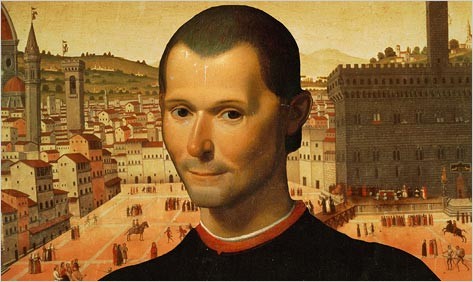
Machiavelli & the Conservative Revolution
By Dominique Venner
Ex: http://www.counter-currents.com/
Translated by Greg Johnson
Borne along by the French Spring, the Conservative Revolution is in fashion. One of its most brilliant theorists deserves to be remembered, even if his name has long been maligned. Indeed it is scarcely flattering to be described as “Machiavellesque” if not “Machiavellian.” It can be seen as an aspersion of cynicism and deceit.
And yet what led Niccolò Machiavelli to write the most famous and the most outrageous of his works, The Prince, was love and concern for his fatherland, Italy. It was published in 1513, exactly 500 years ago, just like Albrecht Dürer’s “The Knight, Death, and the Devil[2].” A fertile time! In the early years of the 16th century, Machiavelli was nevertheless the only one to worry about Italy, the “geographical entity,” as Metternich later said. Then, one cared about Naples, Genoa, Rome, Florence, Milan, and Venice, but nobody cared about Italy. This had to wait a good three centuries. This proves that we should never despair. The prophets always preach in the wilderness before their dreams reach the unpredictable waiting crowds. We and some others believe in a Europe that exists only in our creative memory.
Born in Florence in 1469, died in 1527, Niccolò Machiavelli was a high official and diplomat. His missions introduced him to the grand politics of his time. What he learned, and what he suffered for his patriotism, prompted him to reflect on the art of conducting public affairs. Life had enrolled him in the school of great upheavals. He was 23 years old when Lorenzo the Magnificent died in 1492. The same year, the ambitious and voluptuous Alexander VI Borgia became Pope. He swiftly made one of his sons, Cesare (at that time, the popes cared little for chastity), a very young cardinal and then the Duke of Valentinois thanks to the king of France. This Cesare, gripped by a terrible ambition, cared nothing about means. Despite his failures, his ardor fascinated Machiavelli.
But I anticipate. In 1494 came a huge event that would change Italy for a long time. Charles VIII, the ambitious young king of France, made his famous “descent,” i.e., an attempt at conquest that upset the balance of the peninsula. After being well-received in Florence, Rome, and Naples, Charles VIII then met with resistance and was forced to retreat, leaving a terrible chaos. It was not finished. His cousin and successor, Charles XII, came back in 1500, this time for longer, until Francis I became king. Meanwhile, Florence was plunged into civil war, and Italy was devastated by condottieri greedy for loot.
Appalled, Machiavelli observed the damage. He was indignant at the impotence of the Italians. From his reflections arose The Prince in 1513, the famous political treatise written thanks to its author’s disgrace. The argument, with a compelling logic, seeks to convert the reader. The method is historical. It is based on the confrontation between the past and the present. Machiavelli stated his belief that men and things do not change. This is why the Florentine councilor continues to speak to us Europeans.
Following the Ancients–his models–he believes Fortune (chance), represented by a woman balancing on an unstable wheel, rules half of human actions. But she leaves, he says, the other half ruled by the virtues (qualities of manly boldness and energy). Machiavelli calls for men of action and teaches them how to govern well. Symbolized by the lion, force is the primary means to conquer or maintain a state. But one must also have the cunning of the fox. In reality, one must be both lion and fox. “We must be a fox to avoid traps and a lion to frighten wolves” (The Prince, ch. 18). Hence his praise, devoid of any moral prejudice, of Alexander VI Borgia, who “never did anything, and never thought of doing anything, other than deceiving people and always found a way to do so” (The Prince, ch. 18). However, it is in the son of this curious pope, Cesare Borgia, that Machiavelli saw the incarnation of the Prince according to his wishes, able “to win by force or fraud” (The Prince. ch. 7).
Placed on the Index by the Church, accused of impiety and atheism, Machiavelli actually had a complex attitude vis-à-vis religion. Certainly not devout, he nevertheless went along with its practices but without abdicating he critical freedom. In his Discourses on the First Ten Books of Titus Livy, drawing lessons from ancient history, he questioned which religion best suits the health of the state: “Our religion has placed the highest good in humility and contempt for human affairs. The other [Roman religion] placed it in the greatness of soul, bodily strength, and all other things that make men strong. If our religion requires that we have strength, it is only to be more capable of suffering heavy things. This way of life seems to have weakened the world, making it easy prey for evil men” (Discourses, Book II, ch. 2). Machiavelli does not risk religious reflection, but only a political reflection on religion, concluding: “I prefer my fatherland to my soul.”
Source: http://www.dominiquevenner.fr/2013/04/machiavel-et-la-revolution-conservatrice/[3]
Article printed from Counter-Currents Publishing: http://www.counter-currents.com
URL to article: http://www.counter-currents.com/2013/05/machiavelli-and-the-conservative-revolution/
URLs in this post:
[1] Image: http://www.counter-currents.com/wp-content/uploads/2013/05/machiavellistatue.jpg
[2] The Knight, Death, and the Devil: http://en.wikipedia.org/wiki/The_Knight,_Death_and_the_Devil
[3] http://www.dominiquevenner.fr/2013/04/machiavel-et-la-revolution-conservatrice/: http://www.dominiquevenner.fr/2013/04/machiavel-et-la-revolution-conservatrice/